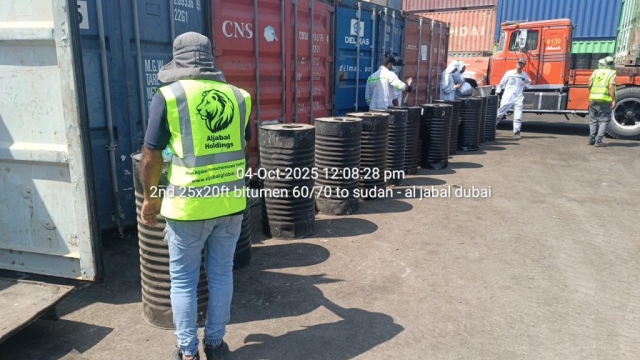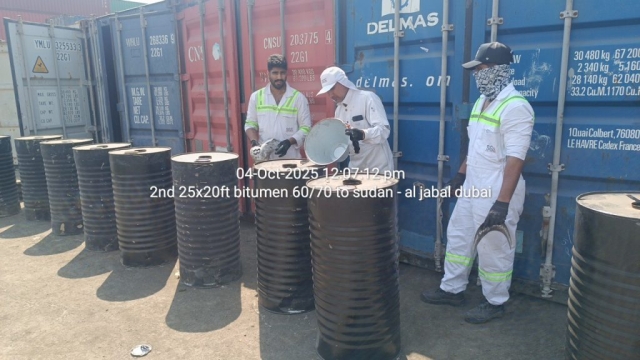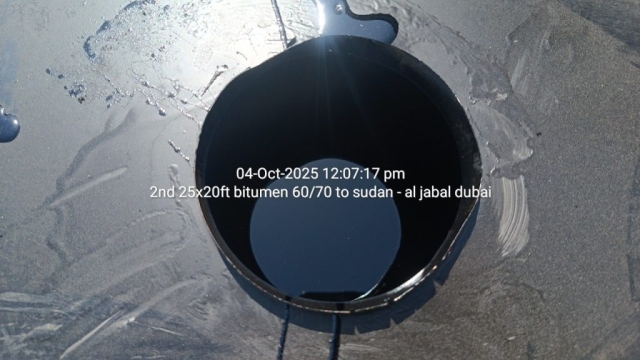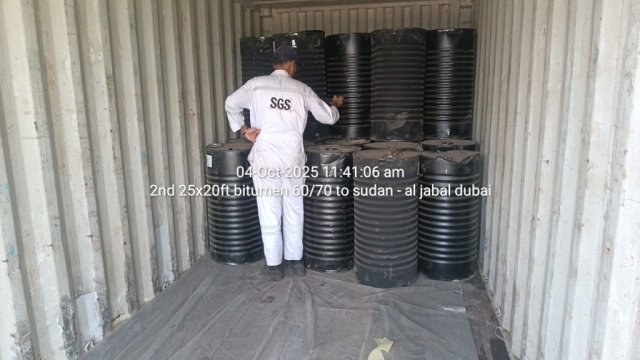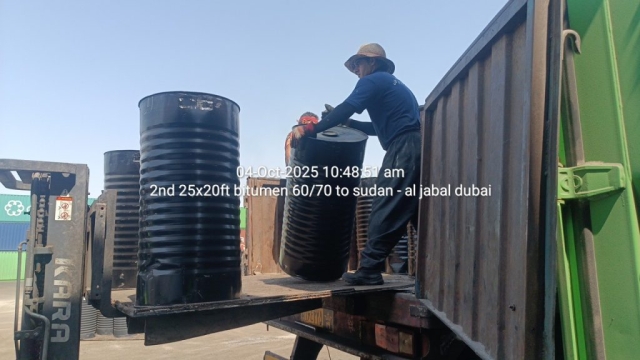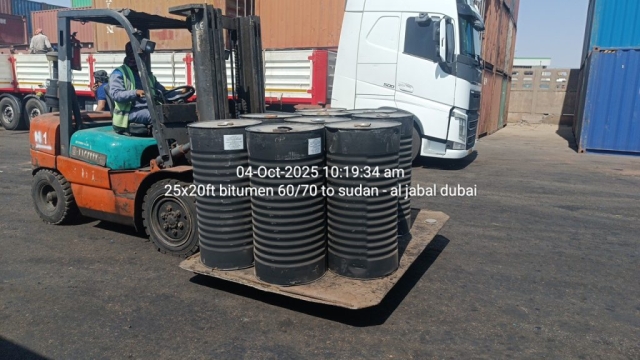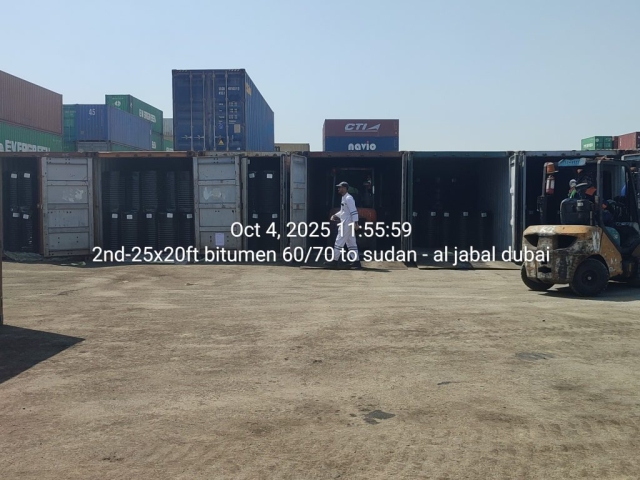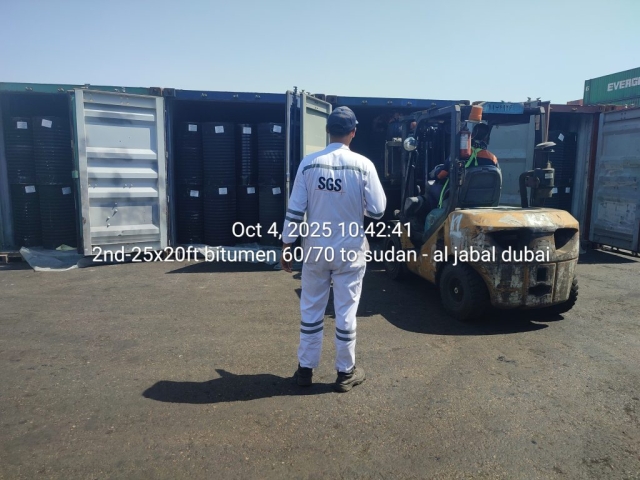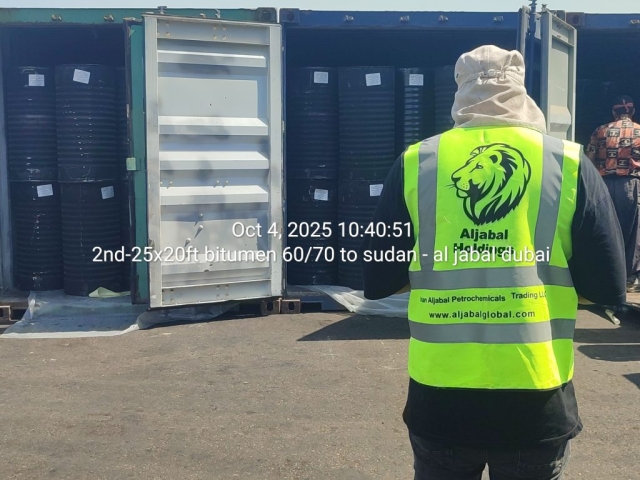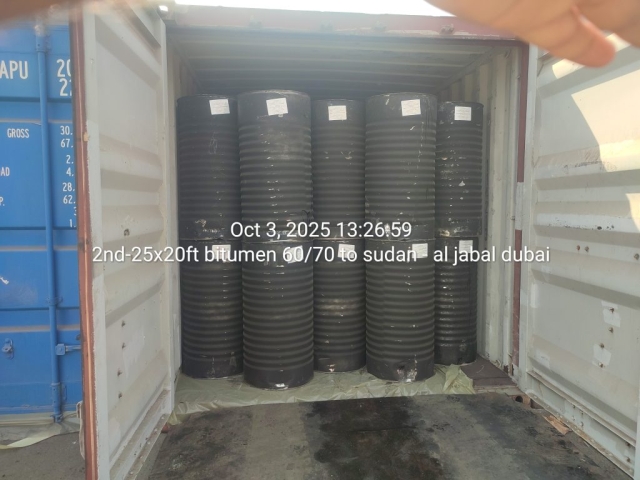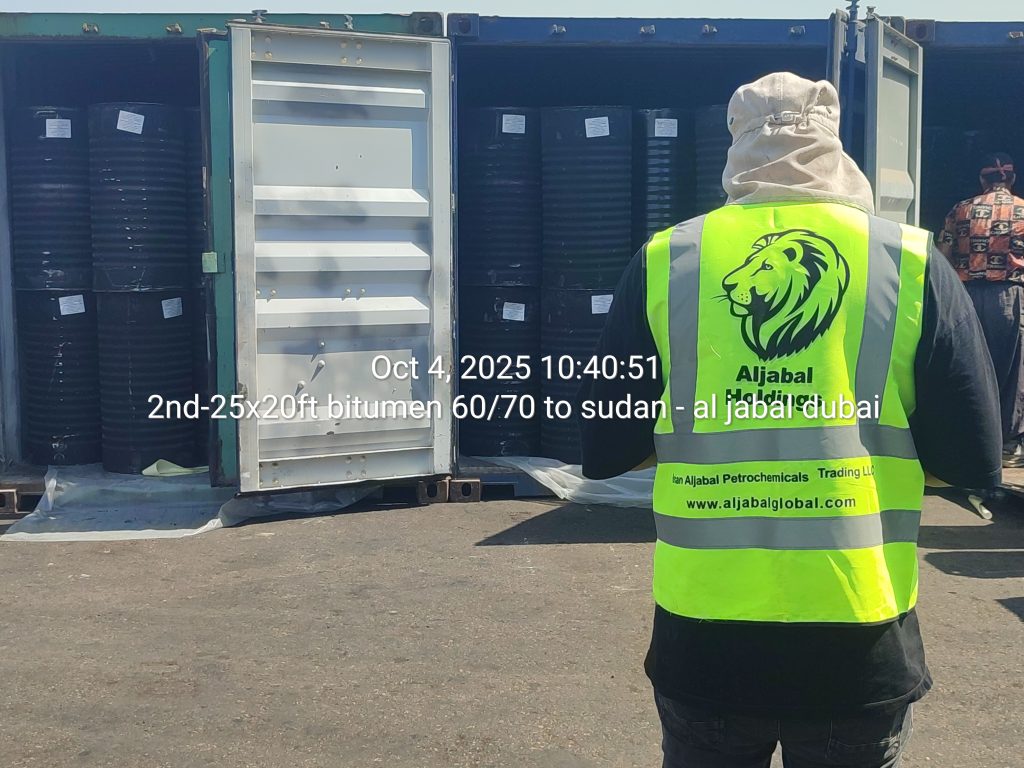
Introduction
Aljabal Holding, a prominent name in the global bitumen trade, has successfully completed its second shipment of 25×20 ft containers of Bitumen 60/70 to Sudan in October 2025. This move further strengthens its position in the East African market, particularly in Sudan’s booming infrastructure sector. Following a well-received initial shipment earlier in the year, this latest delivery marks a significant milestone in the company’s regional expansion strategy.
Sudan, aiming to revitalize its infrastructure post-political transition, has been a key target market for global suppliers of construction materials, particularly high-quality bitumen. With roads, airports, and urban highways in dire need of redevelopment, the demand for durable, temperature-resistant paving materials is at an all-time high. Aljabal’s timely supply of Bitumen 60/70 not only meets this demand but also sets new benchmarks in quality and service delivery.
This detailed report dives into the full scope of the second shipment—from technical specifics of the bitumen to logistical coordination, local partnerships, and market response in Sudan. It showcases how Aljabal Holding has mastered the art of international trade by aligning its operations with both global best practices and regional needs.
Overview of Aljabal Holding
Aljabal Holding is a UAE-based conglomerate known for its strong foothold in the energy, petrochemical, and construction materials sectors. Over the past two decades, the company has expanded its global reach, exporting high-quality bitumen to regions like Africa, South Asia, and the Middle East.
With a sharp focus on customer satisfaction and supply chain efficiency, Aljabal Holding has carved out a niche for itself as a reliable bitumen supplier. Its operations are backed by advanced refining technologies, international certifications, and a skilled team that ensures seamless transactions from refinery to port.
What truly sets Aljabal apart is its ability to understand regional demands. Whether it’s tailoring packaging to local weather conditions or aligning shipment schedules with project timelines, Aljabal excels in adaptive logistics and strategic foresight.
The Sudan export initiative represents more than just a trade opportunity—it reflects Aljabal’s long-term commitment to contributing toward sustainable development in emerging economies.
Understanding Bitumen 60/70
Bitumen 60/70 is a penetration-grade bitumen widely used in road construction and industrial applications. The numbers 60 and 70 denote the penetration range measured in tenths of a millimeter, reflecting the bitumen’s hardness and viscosity. This grade strikes the perfect balance between softness and durability, making it ideal for regions with moderate to high temperatures.
Key Specifications:
- Penetration: 60–70 dmm at 25°C
- Softening Point: 49–56°C
- Flash Point: Minimum 232°C
- Solubility in Trichloroethylene: > 99.0%
- Viscosity @ 135°C: Meets ASTM standards
Used primarily in asphalt paving, this grade is known for high adhesion, water resistance, and long life expectancy under traffic load. It’s preferred for highways, expressways, and airport runways where performance and longevity are crucial.
Aljabal sources its bitumen from advanced refineries that maintain stringent quality controls. Each batch is tested and certified before shipment, ensuring consistency in composition and performance on the field.
Bitumen Market in Sudan
Sudan’s infrastructure is undergoing a massive transformation fueled by government investments and international partnerships. Bitumen, being a foundational material in road construction, plays a critical role in this development journey.
Key Drivers of Demand:
- Urbanization: Growing cities like Khartoum, Omdurman, and Port Sudan require robust transport networks.
- Trade Corridors: Sudan’s strategic location between North and Sub-Saharan Africa makes road infrastructure a national priority.
- Public Projects: With aid from the African Development Bank and other bodies, Sudan is building roads, bridges, and industrial parks.
However, sourcing quality bitumen locally remains a challenge due to limited refining capacities. This is where Aljabal Holding steps in—by providing international-grade Bitumen 60/70, it bridges the gap between demand and supply, ensuring that Sudan’s infrastructural ambitions are met without compromising on quality.
First Shipment Recap
Before diving into the details of the second shipment, it’s important to take a quick look back at the first successful delivery of Bitumen 60/70 to Sudan by Aljabal Holding. Earlier in 2025, the company exported a similar consignment, which acted as a pilot shipment to test the market and logistics framework.
That first shipment consisted of 25×20 ft containers, totaling over 500 metric tons of bitumen, and was delivered to Port Sudan. The feedback from local contractors, construction firms, and infrastructure consultants was overwhelmingly positive. They appreciated the quality, prompt delivery, and professional handling of the cargo.
One of the most significant takeaways from the first delivery was the importance of maintaining proper temperature control during transit and ensuring that the bitumen packaging remained intact despite long-haul shipping conditions. Aljabal made necessary improvements, such as double-sealing drums and adding temperature-control monitoring, to make the second shipment even more seamless.
The first shipment laid the groundwork for trust, allowing Aljabal to scale up operations confidently with the larger, second shipment delivered in October 2025.
Details of the Second Shipment
The second shipment, finalized in October 2025, was a scaled-up effort reflecting Aljabal Holding’s confidence in the Sudanese market and its growing relationships with government-backed infrastructure projects. A total of 25 containers, each 20 feet in size, were packed and shipped with precision.
Shipment Breakdown:
- Date of Dispatch: October 14, 2025
- Date of Arrival in Sudan: October 27, 2025
- Total Bitumen Volume: Approx. 500 metric tons
- Container Type: 20 ft GP (General Purpose) containers
- Packaging: New steel drums with double sealing
- Shipping Route: From Jebel Ali Port (UAE) to Port Sudan
Each container was carefully loaded with steel drums, each holding around 150 kg of bitumen, and was secured with anti-leakage measures. All drums were heat-treated and rust-proofed to withstand harsh weather conditions during transit.
Additionally, the shipment was accompanied by a logistics partner, ensuring real-time GPS tracking, temperature monitoring, and safe handling from port to port.
Aljabal also appointed a local Sudanese clearing agent to expedite customs processing and ensure quick handover to contractors waiting on the ground. This level of coordination helped avoid any downtime in project execution due to material delays.
Breakdown of the 25×20 ft Containers
Let’s zoom in on what exactly goes into these 25 containers and why this shipment is considered a significant logistical achievement for Aljabal Holding.
Each 20 ft container has an internal volume of approximately 33.1 cubic meters. Given that bitumen is a dense, viscous material, steel drums are the most suitable packaging for such consignments.
Contents per Container:
- Number of Drums per Container: Approx. 80 drums
- Weight per Drum: 150–160 kg
- Total Weight per Container: ~12,000–13,000 kg
- Packaging Method: Steel drums, double-sealed, shrink-wrapped, and palletized
Across 25 containers, the shipment totaled:
- 2,000 drums
- Estimated Total Weight: 500 metric tons
- Packaging Efficiency: 98% container space utilization
Aljabal’s packaging and container optimization help reduce costs for clients, minimize damage risks, and comply with international shipping safety protocols. They’ve also adopted environment-friendly drums, which are easier to recycle or reuse in Sudan.
Quality Assurance and Certification
One of the key differentiators of Aljabal Holding’s shipments is their uncompromising quality control process. Before the bitumen is even packaged, it undergoes multiple rounds of lab testing to ensure it meets the exact penetration grade 60/70 and adheres to ASTM D946/D946M standards.
Certification Checklist:
- Quality Certificate of Analysis (COA)
- Material Safety Data Sheet (MSDS)
- Penetration Test Reports
- Viscosity Testing Results
- Softening Point Certificates
- Third-party Inspection Report (SGS/BV)
These documents are attached to every shipment and are also uploaded digitally for clients and customs clearance. In addition, each drum is barcoded, which allows clients in Sudan to verify the source and batch through a digital tracking system—a huge value addition in a region where material traceability is still catching up.
By consistently exceeding the standard requirements, Aljabal ensures that every contractor working with their bitumen can confidently meet project benchmarks, whether for highways or industrial roads.
Export Documentation Process
Shipping bitumen across international borders involves a host of documents that must be carefully handled to avoid delays or legal complications. Aljabal Holding has streamlined this process to ensure a smooth, transparent export experience.
Documents Prepared for This Shipment:
- Commercial Invoice
- Packing List
- Bill of Lading
- Certificate of Origin
- Insurance Certificate
- SGS Inspection Report
- Export Declaration
All documents were digitally shared with the Sudanese importer 48 hours prior to cargo arrival to ensure that local customs authorities could start pre-clearance. Furthermore, Aljabal partnered with a customs broker in Sudan to ensure zero hold-up at the port.
This meticulous attention to documentation has built Aljabal’s reputation as a dependable exporter in a sector where paperwork mistakes can cost weeks in project delays.
Port of Origin and Destination
The journey of the second bitumen shipment began at Jebel Ali Port in the United Arab Emirates, one of the busiest and most efficient ports in the Middle East. Known for its world-class infrastructure and seamless handling of industrial cargo, Jebel Ali Port was the ideal origin point for dispatching heavy goods like bitumen.
Port of Origin: Jebel Ali, UAE
- Departure Date: October 14, 2025
- Handling Terminal: DP World Terminal 2
- Loading Duration: 48 hours
- Inspection & Clearance: Completed by UAE Customs and SGS officials
Once cleared for export, the shipment made its way through the Red Sea en route to Port Sudan, a crucial maritime hub on Sudan’s eastern coast.
Port of Destination: Port Sudan, Sudan
- Arrival Date: October 27, 2025
- Receiving Terminal: Container Terminal No. 3
- Customs Authority Involved: Sudanese Maritime & Customs Directorate
- Clearance Time: Under 72 hours (record time due to pre-clearance)
Thanks to Aljabal Holding’s coordination with both port authorities, there were no demurrage charges, no container delays, and zero product damage. This successful port-to-port execution stands as a testament to the company’s superior logistics planning.
Logistical Challenges and Solutions
No international shipment comes without its hurdles. Moving 500 metric tons of highly viscous bitumen across borders—especially into a country like Sudan where infrastructure and bureaucratic challenges still exist—required proactive planning.
Key Challenges Faced:
- Weather Fluctuations: Risk of overheating or cooling during transit
- Port Congestion: Potential delays at Port Sudan due to backlog
- Customs Delays: Lengthy inspection procedures in Sudan
- Drum Integrity: Possibility of leakage from drum seals
Solutions Implemented:
- Temperature Monitoring Systems were embedded into the containers to track heat fluctuations.
- Real-Time GPS Tracking was used to provide updates at every leg of the journey.
- Pre-Submission of Documents to Sudanese authorities to minimize clearance delays.
- Double-Sealed Steel Drums with anti-corrosive coating ensured product integrity.
- Backup Transport Fleet in Sudan was pre-arranged to offload cargo immediately upon arrival.
The end result? A delay-free shipment with zero product loss and a very satisfied local client base.
Collaboration with Sudanese Authorities
Aljabal Holding’s success in executing this shipment hinged on its collaborative approach. Working closely with Sudan’s Ministry of Transport, Customs Directorate, and local logistics firms, the company ensured every piece of red tape was handled before it became a roadblock.
Here’s how the collaboration unfolded:
- Local Import License: Secured ahead of time through a registered Sudanese importer.
- Customs Agent Deployment: Aljabal had an in-country agent stationed at Port Sudan.
- Training for Local Handlers: On-ground labor was trained in safe unloading procedures for bitumen.
- Emergency Contact Centers: A 24/7 hotline was established for port and customs coordination.
Such transparent, cooperative relationships with local authorities allowed Aljabal to navigate complex import regulations while building credibility for future shipments.
Client Feedback and Market Response
The feedback from the Sudanese construction sector has been overwhelmingly positive. Contractors and government project managers noted that the bitumen arrived in perfect condition, ready for immediate use. There were no reports of contamination, leakage, or non-conformance—a critical factor when dealing with hot climate conditions like those in Sudan.
Testimonials from Contractors:
- “This is the highest quality bitumen we’ve received in a long time.”
- “Perfect viscosity. Ready-to-use and exceeded our expectations.”
- “Aljabal has set a new standard in reliability and product integrity.”
The shipment directly supplied two major road development projects—one in Khartoum and another near Port Sudan. Initial performance reports from on-site engineers indicate excellent adhesion, smooth layering, and long curing times.
As word spreads, more local and regional contractors are beginning to request Aljabal bitumen for their projects. The market response has essentially opened the door for a continuous supply agreement between Aljabal and multiple Sudanese infrastructure entities.
Economic Impact in Sudan
This shipment isn’t just about product delivery—it’s about economic contribution. By providing a critical input for infrastructure, Aljabal’s export is fueling job creation, trade connectivity, and regional development.
Key Economic Benefits:
- Supports Road Construction Projects vital to Sudan’s economy.
- Creates Jobs in transportation, logistics, and construction sectors.
- Boosts Trade Routes with improved roads leading to better commerce.
- Stimulates Ancillary Industries like packaging recycling and construction materials.
Moreover, the reliable delivery of industrial materials from global partners like Aljabal encourages more foreign direct investment (FDI) in Sudan, building momentum for economic reform and global trade.
Environmental Considerations
In today’s global market, sustainability isn’t just a buzzword—it’s a necessity. Aljabal Holding has been proactive in ensuring that its bitumen exports to Sudan adhere to environmental safety and sustainability standards. This second shipment reflects the company’s evolving strategy to reduce environmental impact without compromising on product quality.
Green Initiatives Implemented:
- Eco-Friendly Drums: The bitumen was packed in 100% recyclable steel drums that comply with ISO environmental packaging standards.
- Emission Controls: The shipment utilized low-emission cargo vessels that follow IMO 2020 regulations, reducing sulfur emissions.
- Reduced Wastage: Smart load planning ensured that over 98% of container space was used, reducing the carbon footprint per unit.
- Local Recycling Partnerships: Aljabal has initiated talks with local Sudanese recyclers to repurpose or reuse empty drums after project completion.
The drum coating used is also environmentally safe, preventing any chemical leaching into the soil once emptied. Additionally, Aljabal’s logistics partners were chosen for their ISO 14001 certifications, ensuring that environmental safety practices were maintained throughout the supply chain.
By aligning its operational goals with global sustainability standards, Aljabal is not only serving clients—it’s paving the way for greener trade practices in the construction materials industry.
Competitor Analysis
The bitumen supply market in East Africa, particularly in Sudan, is becoming increasingly competitive. Several suppliers from India, China, and the Middle East are targeting this region due to its infrastructure boom. However, Aljabal Holding continues to outperform competitors in several key areas.
Aljabal vs. Competitors:
| Feature | Aljabal Holding | Shell | ENCO |
|---|---|---|---|
| Product Quality | Premium 60/70 | Medium | Inconsistent |
| Delivery Time | On schedule | Delayed | Variable |
| Packaging | Double-sealed drums | Standard drums | Low-grade containers |
| Local Partnerships | Established | Limited | None |
| Sustainability Practices | Advanced | Basic | Not disclosed |
| Customer Support | 24/7 dedicated | Email-only | Limited hours |
Aljabal’s end-to-end service model—from quality control to last-mile delivery—gives it a clear advantage. Unlike suppliers who focus solely on dispatch, Aljabal focuses on customer experience and post-delivery performance, which builds long-term loyalty.
Moreover, their investment in Sudan-specific logistics planning means fewer delays, fewer claims, and faster project turnarounds for their clients.
Strategic Vision Behind Sudan Export
So, what’s the bigger picture? Aljabal Holding isn’t just shipping bitumen—they’re strategically positioning themselves as a long-term infrastructure partner in East Africa.
Strategic Objectives:
- Market Expansion: Entering Sudan is part of a broader East African market push, including Ethiopia, South Sudan, and Uganda.
- Regional Trade Ties: Building strategic trade lanes and warehousing hubs in Africa to reduce lead times.
- Government Collaboration: Strengthening relationships with public sector infrastructure projects.
- Brand Building: Establishing Aljabal as a preferred bitumen brand across African markets.
This second shipment to Sudan is a signal to the market: Aljabal is here to stay. It’s a foundation stone in a larger trade and development strategy aimed at becoming the top bitumen exporter across Africa by 2030.
Future Export Plans
With the success of the first two shipments, Aljabal Holding is already setting its sights on future consignments and market entries. Based on feedback and increasing demand, the company plans to double its exports to Sudan by Q1 2026.
Upcoming Initiatives:
- Monthly Shipments: Launch of a fixed monthly export calendar for Sudan.
- Warehouse Setup: Plans to establish a bonded warehouse near Port Sudan for faster distribution.
- On-Site Technical Support: Deploying field engineers to assist with bitumen application and training.
- New Product Grades: Introducing PMB (Polymer Modified Bitumen) for highway projects and industrial roads.
In addition to Sudan, discussions are already underway with construction firms in Chad, Eritrea, and the Democratic Republic of Congo, as Aljabal continues to expand its African footprint.
Conclusion
The successful delivery of 25×20 ft containers of Bitumen 60/70 to Sudan by Aljabal Holding in October 2025 is more than just a logistics achievement. It represents quality, reliability, and strategic foresight. From origin to destination, every detail was meticulously planned and flawlessly executed. The Sudanese construction sector received high-grade bitumen on time, in perfect condition, and ready to power the country’s infrastructure development.
With growing demand, established local partnerships, and a forward-thinking approach, Aljabal Holding is not only a supplier—but a trusted partner in Africa’s growth story.
FAQs
1. What is the grade 60/70 bitumen used for?
Bitumen 60/70 is mainly used in road construction, specifically in surface dressing, paving, and highway projects. It offers a perfect balance of hardness and flexibility suitable for hot climates like Sudan.
2. Why did Aljabal choose Sudan for export?
Sudan is undergoing a massive infrastructure revival. With increasing demand for road materials and limited local production, Aljabal saw a strong opportunity to provide reliable, high-quality bitumen to support national development.
3. How does the shipment process work?
Aljabal oversees every stage—from refining and lab testing to packaging, documentation, shipping, and customs clearance. They partner with logistics and customs experts to ensure smooth delivery from port to project site.
4. What ensures the bitumen’s quality?
Every batch of bitumen is lab-tested and certified for penetration, viscosity, and softening point. International third-party inspectors like SGS verify the quality before shipment.
5. Is Aljabal planning more exports?
Yes. Aljabal is expanding its operations in Sudan and across East Africa, with plans to launch monthly shipments, introduce new product lines, and establish bonded warehouses in the region.

